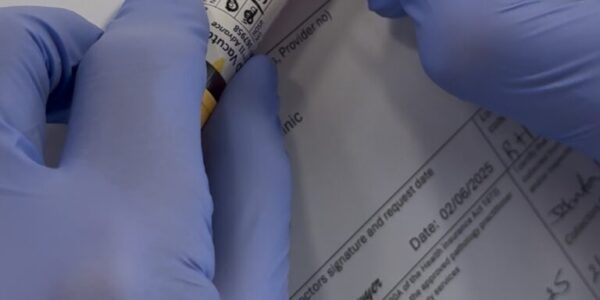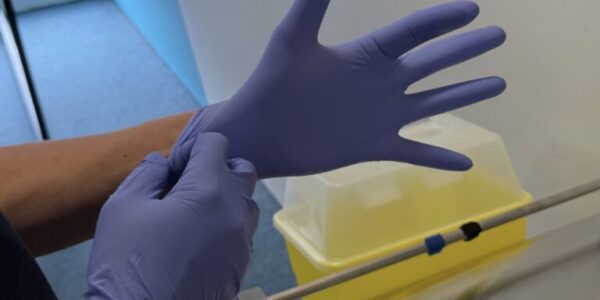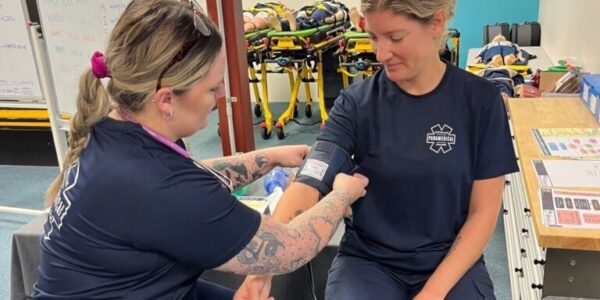What Is a Pathology Collector?
A pathology collector (Phlebotomists) is a trained healthcare worker who collects blood, urine, and other specimens from patients for laboratory testing. To become a pathology collector in Australia, you must complete a Certificate III in Pathology Collection (HLT37215), develop patient-care skills, and meet basic entry requirements like police and health checks.
Pathology collectors play an important role in the medical system. The samples they collect help pathologists and doctors diagnose and monitor health conditions. These tests support treatment decisions and long-term care.
Their main tasks include:
- Collecting blood using safe venepuncture techniques
- Gathering other samples like urine or swabs
- Labelling and storing specimens correctly
- Communicating clearly with patients
- Following infection control and safety procedures
Step 1: Complete a Certificate III in Pathology Collection – HLT37215
The first step to becoming a pathology collector in Australia is completing the Certificate III in Pathology Collection HLT37215. This is the nationally recognised qualification required for most entry-level roles.
The course provides both theoretical and practical training. You will learn how to:
- Collect blood, urine, and other pathology samples
- Follow infection control and hygiene procedures
- Communicate with patients and team members
- Record and label specimens correctly
Most students finish the course in 6 to 12 months, depending on whether they study full-time or part-time. Some providers offer flexible online options with in-person practical workshops and clinical placements.
Once completed, you will be qualified to apply for roles in hospitals, clinics, pathology labs, and mobile collection units.
Entry Requirements
There are no formal academic entry requirements for the Certificate III in Pathology Collection. However, most training providers expect you to:
- Be at least 17 years old (parental consent is required for applicants under 18).*
- Have basic English and communication skills
- Pass a Language, Literacy and Numeracy (LLN) assessment (if required)
- Hold or be willing to obtain a National Police Check and Working with Children Check
- Immunisation Records
- Be physically able to perform tasks such as standing for long periods and handling specimens
*All students must be at least 18 years old to undertake their Clinical Placement training as part of completing the course.
Step 2: Gain Relevant Experience
As part of your Certificate III in Pathology Collection, you will complete clinical placement in a real healthcare setting. This gives you hands-on experience and helps prepare you for the demands of the job.
During placement, you will:
- Collect specimens using correct technique
- Communicate with patients professionally
- Work under the supervision of qualified staff
- Follow safety and infection control procedures
- Learn how to manage administrative and labelling tasks
This experience is essential for applying your training in a real-world environment. After you complete your course, employers may still value extra experience. You can build on your placement by seeking casual or entry-level work in medical clinics, aged care, or community health services.
Gaining early experience will help you become more confident and competitive when applying for your first pathology collector role.
Step 3: Explore Job Opportunities
After completing your training and meeting all requirements, you can begin applying for pathology collection roles. Jobs are available across both public and private healthcare settings.
Common employers include:
- Public hospitals and community health services
- Private pathology companies
- General practice clinics
- Specialist medical centres
- Aged care facilities
- Mobile collection services
Job titles may vary. You might see roles listed as Pathology Collector, Specimen Collector, or Phlebotomist. Most roles are part-time or full-time, with early morning or rotating shifts.
To improve your chances, make sure your resume highlights:
- Your Certificate III qualification
- Clinical placement experience
- Relevant checks (police, Working with Children)
- Strong communication and patient care skills
Job search platforms like Seek, Indeed, and healthcare recruitment agencies are good places to start. You can also approach local clinics and labs directly to ask about upcoming vacancies.
Skills Needed to Succeed
To work effectively as a pathology collector, you need more than just technical knowledge. Employers look for candidates who can work safely, communicate clearly, and provide a positive experience for patients.
Clear communication
You must explain procedures to patients, ask questions, and record information accurately.
Good hand–eye coordination
Collecting blood and other specimens requires steady hands and careful technique.
Ability to work with patients
You need to remain calm, respectful, and supportive, especially when working with nervous or unwell individuals.
Attention to hygiene and safety protocols
Following infection control procedures protects both you and your patients. You must understand and apply safety guidelines at all times.
Career Progression Opportunities
Starting as a pathology collector can open the door to other roles in healthcare. With experience and further study, you may choose to move into more advanced or specialised positions.
Common progression paths include:
Senior Pathology Collector
Oversee junior staff, manage collection processes, and take on higher responsibility in busy clinics or labs.
Laboratory Technician (with further study)
Assist with testing and analysis inside the lab. This usually requires a Certificate IV or Diploma in Laboratory Techniques or a related qualification.
Medical Administration or Specimen Logistics
Work behind the scenes managing patient data, coordinating sample transport, or supporting daily lab operations.
Key Summary:
A pathology collector plays an important role in healthcare by collecting samples that support diagnosis and treatment. To start in this career, you will need to:
- Complete a Certificate III in Pathology Collection (HLT37215)
- Gain hands-on experience through clinical placement
- Meet additional requirements such as police checks and immunisation records
- Apply for roles in hospitals, clinics, and pathology labs
If you’re interested in working in healthcare and enjoy practical, people-focused work, this could be the right path for you.
Next steps:
- Research accredited training providers
- Confirm you meet the basic entry requirements
- Enrol in the Certificate III to begin your training
Start your journey towards a career in pathology collection.


